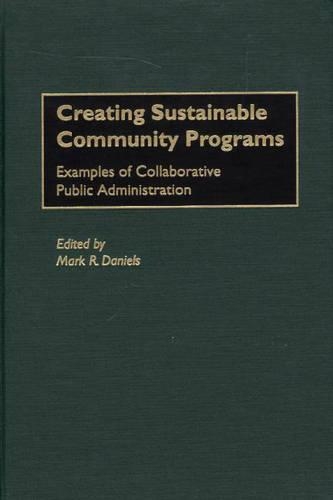
Creating Sustainable Community Programs: Examples of Collaborative Public Administration
(Hardback)
Publishing Details
Creating Sustainable Community Programs: Examples of Collaborative Public Administration
By (Author) Mark R. Daniels
Bloomsbury Publishing PLC
Praeger Publishers Inc
28th February 2001
United States
Classifications
Tertiary Education
Non Fiction
Sustainability
Central / national / federal government
354.2793
Physical Properties
Hardback
320
Description
Public opinion polls consistently reveal the lack of confidence, disillusionment, and mistrust that citizens feel toward government. Daniels and his contributors believe that the relationship between citizens and their governments can be changed by facilitating greater citizen collaboration with government, particularly through local sustainable programs. As the case studies show, often sustainable community programs are created through grassroots movements that are initiated and managed by citizens themselves, bringing them in contact with their local elected and appointed officials. Unlike traditional programs that are administered by local officials on behalf of their citizens, once sustainable community programs are created, citizens administer their own programs in collaboration with local officials. The case studies look at a variety of sustainable programs, primarily in the United States, that help to deal with issues such as recycling, transportation, microcredit, site redevelopment, pollution, health care, and hunger. Creating Sustainable Community Programs is the first book on sustainable programs that is intended for an audience of public administration scholars, researchers, and students as well as practitioners who are searching for ways to change the relationship between citizens and their governments.
Reviews
"Although engaging people in governance is an important theoretical and practical issue in contemporary public administration, there are a few resources that show how the thorny issues of engagment and participation get worked out in practice. Creating Sustainable Community Programs helps fill this gap. The chapters in this edited volume speak to the lessons learned from community programs that resulted in self-supporting outcomes. The book demonstrates the link between these sustainable community programs and a greater development, planning, and municipal water policy to transportation, environmentatl issues, and solid waste--show that it is possible to move from the traditional to the sustainable in a way that encourages both good governance and the growth of community."-Cheryl Simrel King co-author of Government is Us: Public Administration in an Anti-govenment Era
"Creating Sustainable Community Programs is an outstanding presentation of a number of analytical case studies of community development progrms throughout the United States. It is an invaluable resource for everyone interested in uplifting communities from the grassroots."-Thomas Vocino Distinguished Research Professor Head of the Department of Political Science and Public Administration Auburn University at Montgomery
.,."a resource for US public administration students..."-Urban Studies
...a resource for US public administration students...-Urban Studies
Daniel's collection of examples of sustainable community development is wide-ranging and most of the papers provide insights into the practice of community development in many facets. The book is useful not only for students of public administration but also for practitioners.-Development Policy Review
..."a resource for US public administration students..."-Urban Studies
"Daniel's collection of examples of sustainable community development is wide-ranging and most of the papers provide insights into the practice of community development in many facets. The book is useful not only for students of public administration but also for practitioners."-Development Policy Review
Author Bio
MARK R. DANIELS is an Associate Professor of Government and Public Affairs and Director of the Graduate Program in Public Administration at Slippery Rock University of Pennsylvania./e Among Professor Daniels' earlier publications are Terminating Public Programs: An American Political Paradox and Medicaid Reform and the American States: Cases Studies on the Politics of Managed Care (Auburn House, 1998).
